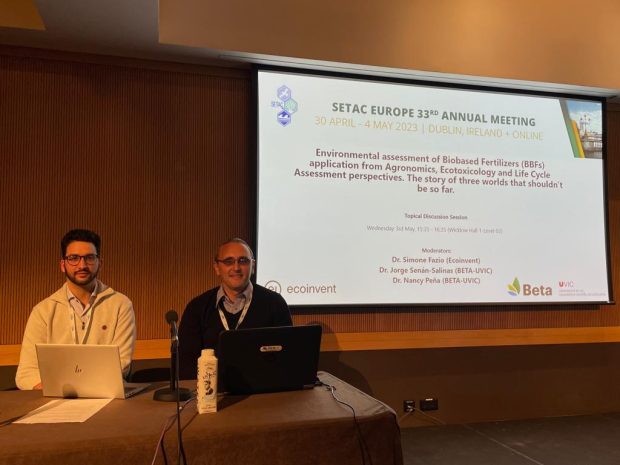CT BETA presents several projects at the 33rd SETAC Congress in Dublin
SETAC is a global non-profit organisation that aims to contribute to finding solutions to environmental problems through research, education and management of natural resources

The researcher Jorge Senán-Salinas, from the Accounting and Sustainability Optimisation group of the BETA Technology Centre at UVic-UCC, presented the results of several European projects in which the centre is currently involved, at the 33rd congress of the SETAC (Society of Environmental (Toxicology and Chemistry), which was held from 30 April to 4 May. Senán-Salinas also co-chaired a discussion session on the environmental assessment of new bio-based fertiliser products.
This debate session provided interesting answers to the problem of how best to apply measures for calculating the sustainability of new fertiliser products, bringing together perspectives from the world of agronomy, ecotoxicology and life cycle assessment (LCA). Part of the discussion focused on the sustainability of bio-based fertilisers versus traditional mineral products. The session served, among others, to present methodological definitions and some market trends, as well as to put on the table the challenges of shaping their impact through the approaches offered by LCA at all levels. Improving the application of LCA methodologies applied to these products should help to make sounder decisions in the transition to more sustainable agricultural models.
Presentation of the Vivaldi and Novafert projects
One of the projects presented at the SETAC Congress in Dublin was Vivaldi, coordinated by GENOCOV. This project focuses on “Carbon Capture for Use” technologies, which allow the direct conversion of biogenic carbon dioxide from bioindustries into value-added organic acids. BETA TC participates by contributing to solving some methodological aspects related to the assessment of the actual sustainability of these emerging technologies. The correct application of sustainability assessment methodologies should facilitate the emergence of new business models or new policy frameworks related to them. This will help to better assess the sustainability of these technologies and promote their use more effectively in the future.
Another project presented at the SETAC Congress is Novafert, which under the coordination of Ghent University, aims, among other objectives, to propose a PEF-compatible methodology for new bio-based fertilisers covering all stages of their life cycle, from production to application. Among other things, Novafert will help to identify key challenges and methodological options within existing guidelines and databases, with the intention of generating a broader consensus and moving towards a common method.
SETAC is a global non-profit organisation that aims to contribute to finding solutions to environmental problems through research, education and natural resource management. Through its activities, it aims to promote understanding of emerging environmental issues at all levels, and to facilitate networking among the scientific community. In particular, its congresses have become an important source of information for professionals working in the field of toxicology and environmental chemistry.
